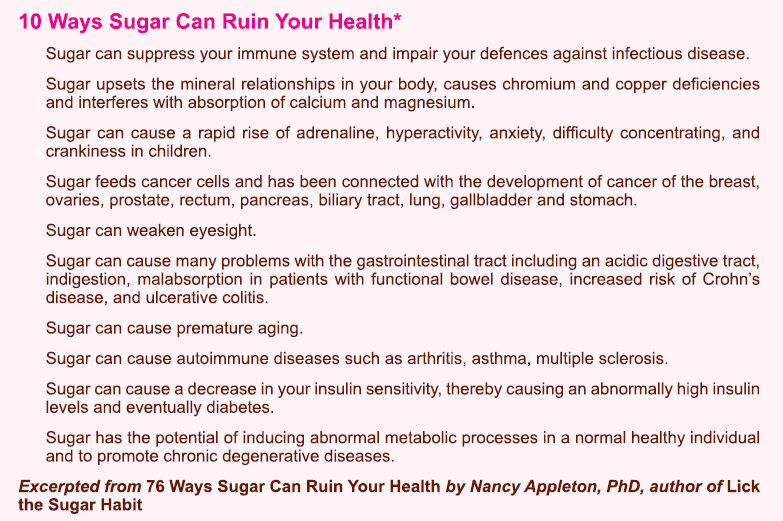
Cocaine, heroin, or some other illegal drug? No, this article involves none of the above. The legal white poison these days happens to be refined sugar.
Everyday, hundreds of companies push their attractively packaged products at us. Stunning labels with attractive, mouth watering pictures of what looks like food to die for (a statement that may just come to pass if you actually eat these products) are targeting our families but where is the necessary information to show that these foods are safe, nutritious or health giving?
This is a subject that most people would just raise their eyebrows at and take absolutely no notice of. However, your life is now in your hands and I hope for your sake that you take the time to read a little more. Thirty Years ago, I watched an ABC Hypothetical program which was entitled “Could Sugar be the End of the Human Race?”
This concept was so confronting that it stayed with me for all this time. What began as a challenging hypothesis has now been shown to be truth. There is now documented evidence to show that sugar is a leading cause of more than 70 illnesses – some with fatal consequences. For the sweet tooth, this maybe hard to swallow, but you are the one this article is directed at. In your defense, there are reasons why you may be addicted to sugar.
Laboratory experiments with rats have shown that sugar is more addictive than cocaine. When rats were offered a choice of sugar or cocaine, they chose sugar. When rats that were already addicted to cocaine were offered the same choice, they chose sugar and, when addicted to sugar and then offered cocaine, they stayed with sugar. Children today consume an average of 29 spoonfuls of refined sugar every day. In fact, the white poison is in virtually every product you desire. That’s why it’s there – to make you desire it.
Let’s take this to another level. Why, if sugar is so bad for us, aren’t we told more about its dangers? The motivation to withhold information on the dangers of refined sugar can be related to the lack of public data on so many issues. Namely why we aren’t told about less dangerous fuels; why we aren’t given more information on the dangers of prescribed drugs; or why is it margarine – which is only one molecule away from being plastic – is sold to us as a healthy alternative to butter.
The simple answer is money. Sugar is a multi-billion dollar business. It’s in almost every refined food. We often only think of sugar as being in sweets and soft drinks or as something we add to our tea or coffee. But look a little closer and you will see that it is actually in just about everything – canned foods, tomato sauce, fruit juices, yoghurt, beer and many breads. When McDonald’s first came to Australia, they were the first to put sugar in their rolls – a move which has been copied by many other baked-good manufacturers.
Both candida and cancer appreciate your love for sugar
How often have you heard someone say, “I could die for a piece of chocolate”? That statement might be closer to the truth than they think. While they are enjoying that lovely, sweet mouth-watering bar of chocolate, both cancer and candida are having their daily feed. You see, many cancers have a need for sugar and, just like you, they love it.
My way of testing to see if someone has candida is to ask him or her, “Can you start a bar of chocolate and stop after the first row”? If their Answer is “No”, then there is a good chance that they are suffering from an overgrowth of candida. If you decide at this point not to read on, have a think about how smokers were deceived for decades into putting toxic poisons into their lungs. It made no sense to the non-smoker. And even once information on the dangers began to emerge, many people could not understand why someone would do something that they knew could cause them to die prematurely. It took decades for cigarette companies to come clean and this only happened because the overwhelming evidence, discovered via lawsuits, made it impossible for them to continue to cover up truth.

Now, it is time to take a step back and have a good look at your own situation. Do you or someone close to you use too much sugar? Many who love their comfort sweets may have the same view as the addicted smoker: I have to die of something so it may as well be something I enjoy.
Yet when someone develops cancer or some other chronic condition, they often ask, “Why me? What have I done to deserve this?”
Just as it took a long time for the general population to discover that smoking is dangerous, it seems to be that too few of us know the hidden dangers of sugar. And once we know about them, we may be left in a position of being addicted and suffering from the Candida overgrowth that so often accompanies that condition.
What can you do?
Reducing Candida would help, not only with sugar cravings but with many other conditions that this overgrowth creates. Once you manage to get Candida under control, you will find that your sugar cravings are naturally and finally reduced or even go away completely.
In addition, it is a good idea to try a good, food-based probiotic. The friendly bacteria can assist in controlling the excess of Candida. It has been noted that after a few months, sugar cravings diminish and a sense of well-being will become evident. By controlling the sugar rush and reducing the amount of “white poison” consumed, an improvement in your health status will almost always ensue.
The most important thing is to get the sugar consumption under control. Reducing Candida in the system will make this much simpler. The long-Term benefits will far outweigh the short-term loss of comfort food. It took decades to convince people that smoking causes cancer. Let’s hope it takes less time for people to wake up to the dangers of sugar.
Don recently returned to Australia from the UK where he marketed health products and lectured on health and the importance of bacteria. Since returning to Australia he has further developed his fermented food range to include a probiotic for those avoiding gluten and dairy in their diets.
For more information visit www.nuferm.com or call NuFerm direct on 07 5549 2554.





